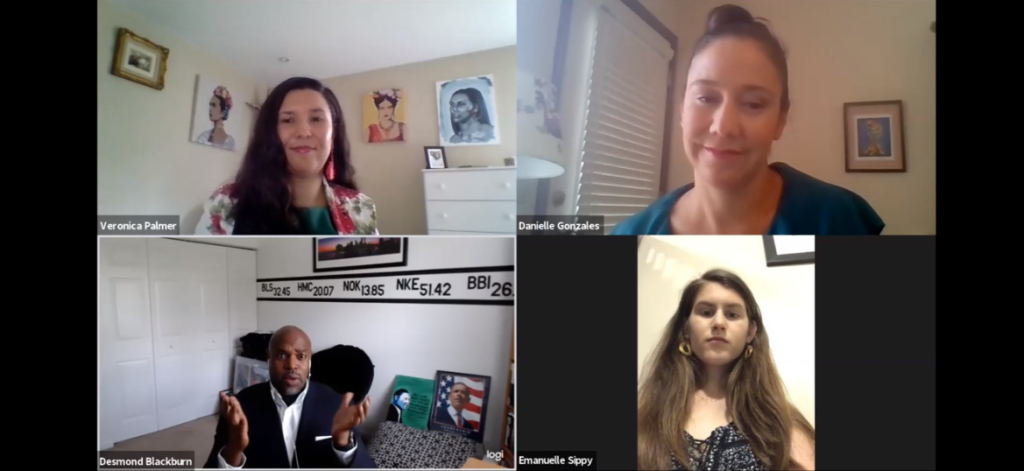Equity and Agency Webinar
Nothing About Us, Without Us: Recap of our July 2 Webinar on Equity and Agency for Education Recovery and Renewal
At its core, education is about dignity. Every individual comprising or served by the public education system should be recognized as an equal partner in making the decisions that shape and impact their life. The events of 2020 should place this idea at the center of conversations about equity and agency now taking place in communities preparing for the coming school year.
Now more than ever, equity is about providing resources relative to need, but equity is also about who decides and who holds power. The lived experiences of the pandemic, which in many places include economic hardship, as well as grief, isolation, and death, warrant attention and action. The national conversation about systemic racism demands we set a more inclusive table in the future. To acknowledge families as children’s first teachers and appropriately build agency among students, these primary stakeholders must be seen and treated as actors rather than objects in setting education priorities and plans.

TOP, left to right: Veronica Palmer Co-Founder and CEO, RISE Colorado; Danielle Gonzales, Managing Director, Aspen Institute Education & Society Program. BOTTOM, left to right: Desmond Blackburn, CEO, New Teacher Center; Emmy Sippy, Student Co-Director, Prichard Committee Student Voice Team
In May, Aspen Education released five principles for recovery and renewal in the pandemic era. The first principle addresses equity, with an emphasis on engagement, agency, and the power dynamic in public education. We asked three experts to explore this principle more deeply in a webinar on July 2, as the nation prepared to celebrate Independence Day. While the panel’s conversation didn’t sound exactly like the Declaration of Independence, a key takeaway was definitely about ceding power to the people most impacted by its exercise. Panelists Desmond Blackburn of the New Teacher Center, Veronica Palmer of RISE Colorado, and Emanuelle Sippy of the Prichard Committee’s Student Voice Team framed educational equity in terms of civil rights, community organizing, and making the current power structure just a little uncomfortable:
“This is a moment.” (Desmond Blackburn)
Whether it’s because school climate and wraparound services matter more in a pandemic era, or because we want to ensure people have not died in vain, now is the time for change. We are called not just to re-open and replicate, but to renew and re-imagine school. Centering on the needs that students express can make this a time of healing and a watershed year for civil rights.
“Families were not always included in education reform.” (Veronica Palmer)
Education systems are notorious for doing things TO families rather than WITH families. Setting the table for shared decision-making means training teachers how to utilize home visits and time out of the classroom to meet parents where they are, and to listen for ways to embed learning in authentic relationships and community context. It’s not just about transparency and data sharing, it’s about creating true partnerships and collaboration.
“Students need to have the agency to ask questions and think for themselves.” (Emanuelle Sippy)
It’s often said we are preparing young people for careers that don’t yet exist. One way to do that is to build critical thinking skills grounded in agency, questioning, and productive struggle. If students are engaged in important conversations, they learn; likewise, if students see and hear important school conversations but aren’t asked to take leading roles in them, they learn that school does not activate their brilliance or intrinsic motivation to grow. When students are invited to bring their own experiences and develop a sense of belonging, they build relationships that unlock rigor and academic success.
Three Things Every Public Education Leader Can Do Now:
- Commit to including student and family representatives on every task force, committee, and board. Give them an equal voice and vote. Pay them for their time, just as staff are paid.
- Turn the traditional “parent nights” on their head. Have students and parents organize the events and invite school personnel to hear from them, instead of holding another meeting at which school staff broadcast information.
- Seize a teachable moment by incorporating honest conversations about the pandemic’s impact in lessons about health and social studies, and use standards such as those from Teaching Tolerance a framework for anti-bias education.
Learn More
Resources for advancing educational equity through genuine and impactful student and family engagement:
- A Movement Youth Care About
- Culturally & Linguistically Responsive Education
- Education Reimagined
- Equity and SEL
- Fostering Black Male Achievement
- Rubric for Family Engagement
- Rubric for Student Engagement
- Tips for a Listening Tour
- Virtual Home Visits
- For information on the Prichard Committee Student Voice Team – How You Can Do It Too: Contact Rachel Belin, studentvoiceteam@prichardcommittee.org or (859) 233-9849 x 233.